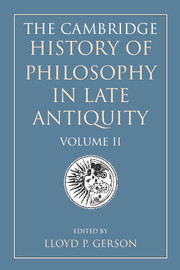Book contents
- Frontmatter
- VI Late Platonism
- Introduction to Part VI
- 32 From Constantine to Justinian
- 33 Plutarch of Athens
- 34 Syrianus
- 35 Proclus
- 36 Ammonius Hermeiou and his school
- 37 Damascius
- 38 Olympiodorus
- 39 Simplicius of Cilicia
- 40 John Philoponus
- 41 Priscian of Lydia and Pseudo-Simplicius on the soul
- VII The third encounter of Christianity with ancient Greek philosophy
- VIII Philosophy in transition
- Appendix: List of works of ancient authors
- List of abbreviations
- Bibliography
- Index locorum
- General index
- References
37 - Damascius
from VI - Late Platonism
Published online by Cambridge University Press: 28 May 2011
- Frontmatter
- VI Late Platonism
- Introduction to Part VI
- 32 From Constantine to Justinian
- 33 Plutarch of Athens
- 34 Syrianus
- 35 Proclus
- 36 Ammonius Hermeiou and his school
- 37 Damascius
- 38 Olympiodorus
- 39 Simplicius of Cilicia
- 40 John Philoponus
- 41 Priscian of Lydia and Pseudo-Simplicius on the soul
- VII The third encounter of Christianity with ancient Greek philosophy
- VIII Philosophy in transition
- Appendix: List of works of ancient authors
- List of abbreviations
- Bibliography
- Index locorum
- General index
- References
Summary
LIFE AND WRITINGS OF DAMASCIUS (AROUND 462 – AFTER 538)
Biographical data
The chronology of the Platonic Academy in later ancient times is relatively well known, owing to the description Damascius furnishes in his Vita Isidori (a biography of Damascius’ beloved teacher, who was probably also one of his predecessors as the head of the Academy). Concerning Damascius’ own life, however, we do not have very detailed knowledge. One of the few facts that are known with certainty is that he originated from Damascus (as we know from Simplicius, In Phys. 624.38 Diels, and from Damascius’ own Vita Isidori 200 Photius). The only dates that are certain are circumstantial to Damascius’ life: the closing down of the pagan schools by the Emperor Justinian in 529, which led to Damascius’ exile; and the date of a stele, found in Homs (Emesa, Syria) in 1925 and dated 538 ce. It bears an epitaph that was known from another literary tradition (the Anthologia Palatina), to be attributed to Damascius:
Zosime, who has been a slave only in body, has now found freedom even from her body.
(Anthologia Palatina VII, 553)
The stele quotes the verse in the first person (‘I, Zosime …’), which suggests that this is the original version of the text, written for this occasion. If that is true, then it is more than probable that Damascius was living in Syria around 538 ce.
According to his own Vita Isidori, Damascius had been in Athens already before 485, when Proclus died. He had been studying rhetoric in Alexandria, and then came to Athens as a teacher of rhetoric.
- Type
- Chapter
- Information
- The Cambridge History of Philosophy in Late Antiquity , pp. 667 - 696Publisher: Cambridge University PressPrint publication year: 2000
References
- 3
- Cited by



